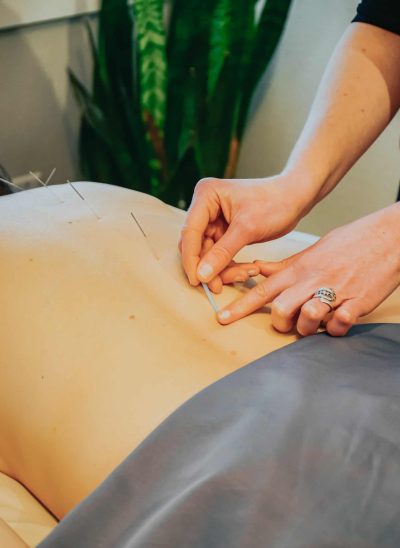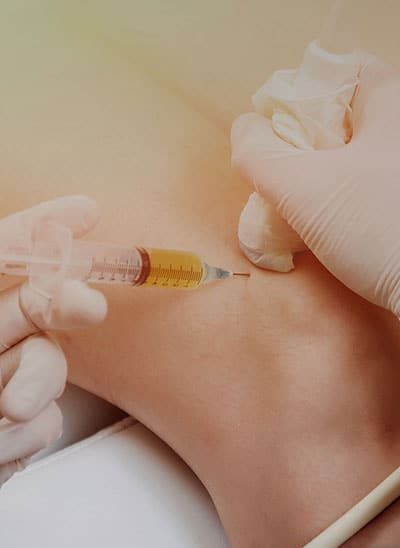At FoRM Health, located in Portland, Oregon, we specialize in providing cutting-edge regenerative medicine treatments that provide lasting relief and enhance overall function for patients dealing with chronic injuries or joint pain. One of our most advanced options is MFAT (Micro-Fragmented Adipose Tissue) injections containing stem cells.
When conservative approaches are not sufficient to address musculoskeletal conditions, we may consider regenerative injections that contain stem cells to help stimulate a healing response. While PRP (Platelet-Rich Plasma) is well-established and effective for many conditions, MFAT injections may be a better option for more advanced cases, such as moderate to severe arthritis, meniscal tears, or substantial partial tendon tears. MFAT can also be combined with PRP for an even stronger regenerative potential.
What is MFAT?
MFAT stands for Micro-Fragmented Adipose Tissue, a minimally processed form of fat tissue rich in mesenchymal stem cells (MSCs), growth factors, and bioactive molecules. This unique composition makes it an ideal regenerative medicine treatment for repairing and regenerating damaged tissues.
Adipose tissue is an abundant source of stem cells and contains essential components like the extracellular matrix, which supports cell survival, growth, and healing. The cellular matrix plays a crucial role by:
- Providing structural support to tissues
- Acting as a scaffold for new tissue growth
- Enhancing cellular communication and coordination for healing
The MFAT Injection Process
When MFAT is injected into a damaged ligament, tendon, joint, or fat pad, your body’s own fat can help promote healing and repair. The process involves:
- Harvesting: A small amount of fat tissue is gently removed from areas like the abdomen, flank, or gluteal region via a mini-liposuction procedure.
- Processing: The harvested fat is processed using a specialized system* to concentrate the healing components while maintaining the natural structure of the fat tissue.
- Injection: The concentrated MFAT is injected into the target area using advanced imaging techniques such as ultrasound, ensuring precise delivery of the cells and supporting tissue matrix.
*FoRM Health in Portland Oregon currently uses the FDA-cleared miniTC device for MFAT preparation in a same-day, sterile procedure. Since fat, stem cells, and other molecules are taken from the same person being treated, the risk of complications and tissue rejection is minimal.
The Advantages of MFAT Injection Therapy
MFAT injection therapy is more than just a stem cell treatment. In addition to stem cells, MFAT also contains:
- Extracellular Matrix (ECM): A natural scaffold that helps support tissue repair and regeneration.
- Vascular Components: Promotes blood flow and tissue oxygenation, aiding in healing.
- Growth Factors: Proteins that stimulate tissue repair and reduce inflammation.
- Pericytes: Cells that help support the blood vessels and further enhance the tissue repair process.
This combination of elements provides not only stem cells but also an entire regenerative environment that supports long-term healing and tissue repair.
Conditions Treated with MFAT Injections
MFAT is used to address a wide range of musculoskeletal conditions, including:
- Osteoarthritis: Common in the knees, hips, and shoulders but also beneficial for facet joints, ankles, thumbs, and more
- Tendon Injuries: partial tears of the rotator cuff, Achilles tendon, or more advanced cases of tennis elbow or similar tendon damage
- Ligament Injuries: Partial tears and chronic sprains
- Meniscal and Labral Injuries
- Chronic Joint Pain: Often related to degenerative conditions, cartilage deficits, or past injuries
Benefits of MFAT Injection Therapy
- Minimally Invasive: Requires a simple outpatient procedure with minimal downtime.
- Comprehensive Healing: Combines stem cells, growth factors, and the extracellular matrix for a multi-faceted healing approach.
- Uses Your Own Tissue: Reducing the risk of rejection or complications.
- Long-Term Relief: Patients often experience sustained pain relief and improved joint function over time.
- Natural Support for Tissue Repair: The matrix and vascular components help create a supportive environment for cell survival and repair.
- Stem Cell Viability: Adipose stem cells don’t seem to lose viability as we age compared to other sources, such as bone marrow
Who is a Good Candidate for MFAT?
MFAT is an ideal option for patients looking to treat joint pain, injuries, or degenerative conditions without undergoing surgery.* Suitable candidates include:
- Those with osteoarthritis and joint degeneration
- Individuals recovering from sports injuries involving partial tendon or ligament tears, or chronic tendonitis
- Certain cartilage deficits
- Patients seeking alternatives to surgery for joint or ligament damage.
*Note: Certain orthopedic conditions absolutely require, or would better be addressed by, surgical intervention. We require a comprehensive intake, exam, and imaging before considering MFAT injections in our Portland clinic.
Why Choose FoRM Health for MFAT?
At FoRM Health, we specialize in regenerative medicine. Our Portland, Oregon, clinic offers advanced therapies like MFAT, which contains stem cells, PRP, and prolotherapy. Our skilled physicians use ultrasound imaging and precision techniques to ensure optimal delivery of the healing components. We personalize every treatment plan to address your specific condition, whether working with our in-house rehab team or coordinating with your preferred physical therapist post-procedure, helping you achieve the best possible outcomes for recovery.
Interested in MFAT Injections?
Schedule with Dr. Ryan Minarik, ND
Can’t wait? Schedule a Thursday appointment with FoRM Resident Dr. Jessica Binshaieg, ND (supervised by Dr. Ryan)
To learn more about MFAT injection therapy and how this treatment can benefit you, contact FoRM Health today. Our team is here to help you navigate your options for a pain-free, active life.
FDA Disclaimer
Micro-Fragmented Adipose Tissue (MFAT) Injections are processed and administered in accordance with the FDA’s guidelines under 21 CFR Part 1271 as a Human Cells, Tissues, and Cellular and Tissue-Based Product (HCT/P). The MFAT procedure involves minimal manipulation of your own adipose tissue and is intended for homologous use, meaning it is used to support the repair, replacement, or reconstruction of damaged tissues.
It is important to note that while MFAT injections are permitted for certain applications under these guidelines, they have not been specifically evaluated or approved by the U.S. Food and Drug Administration (FDA) for the treatment of orthopedic conditions or joint pain. This therapy is used based on clinical judgment, supported by emerging research and patient outcomes.
Supportive Studies (not comprehensive)
- Meta-Analysis of Adipose Tissue Derived Cell-Based Therapy for the Treatment of Knee Osteoarthritis: https://www.ncbi.nlm.nih.gov/pmc/articles/PMC8228374/
- Microfragmented Adipose Tissue Injection (MFAT) May Be a Solution to the Rationing of Total Knee Replacement: https://pubmed.ncbi.nlm.nih.gov/34211557/
- Autologous and micro-fragmented adipose tissue for the treatment of diffuse degenerative knee osteoarthritis: https://sdomg.com/wp-content/uploads/2018/09/Autologous-and-micro-fragmented-adipose-tissue-for-the-treatment-of-diffuse-degenerative-knee_Russo_2017.pdf
- Microfragmented Adipose Tissue Injection (MFAT) May Be a Solution to the Rationing of Total Knee Replacement: A Prospective, Gender-Bias Mitigated, Reproducible Analysis at Two Years: https://www.hindawi.com/journals/sci/2021/9921015/
- Comparison of the Effect of MFAT and MFAT + PRP on Treatment of Hip Osteoarthritis: https://pubmed.ncbi.nlm.nih.gov/35207329/
- Is intra-articular injection of autologous micro-fragmented adipose tissue effective in hip osteoarthritis? A three year follow-up: https://pubmed.ncbi.nlm.nih.gov/36302901/
- Functional Outcomes Following Microfragmented Adipose Tissue Versus Bone Marrow Aspirate Concentrate Injections for Symptomatic Knee Osteoarthritis: https://stemcellsjournals.onlinelibrary.wiley.com/doi/full/10.1002/sctm.18-0285
- Autologous Microfragmented Adipose Tissue for the Treatment of Knee Osteoarthritis: Real-World Data at Two Years Follow-Up: https://www.mdpi.com/2077-0383/11/5/1268/pdf
- Functional Outcomes Following Microfragmented Adipose Tissue Versus Bone Marrow Aspirate Concentrate Injections for Symptomatic Knee Osteoarthritis. https://stemcellsjournals.onlinelibrary.wiley.com/doi/10.1002/sctm.18-0285
- Regenerative Repair of Damaged Meniscus with Autologous Adipose Tissue-Derived Stem Cells. https://www.hindawi.com/journals/bmri/2014/436029/
- The role of adipose-derived mesenchymal stem cells in knee osteoarthritis: a meta-analysis of randomized controlled trials. https://journals.sagepub.com/doi/10.1177/1759720X221146005
- Osteoarthritis of Knee Managed with Allogeneic vs Autologous MSCs: Efficacy and Safety Analysis: https://pubmed.ncbi.nlm.nih.gov/36507199/
Long-Lasting Anti-Inflammatory Activity of Human Microfragmented Adipose Tissue: https://www.hindawi.com/journals/sci/2019/5901479/ (in vitro) - Autologous Micro-Fragmented Adipose Tissue as Stem Cell-Based Natural Scaffold for Cartilage Defect Repair: https://www.ncbi.nlm.nih.gov/pmc/articles/PMC6923561/ (rat)
- San Diego Orthobiologics website study summary: https://sdomg.com/fat/
















